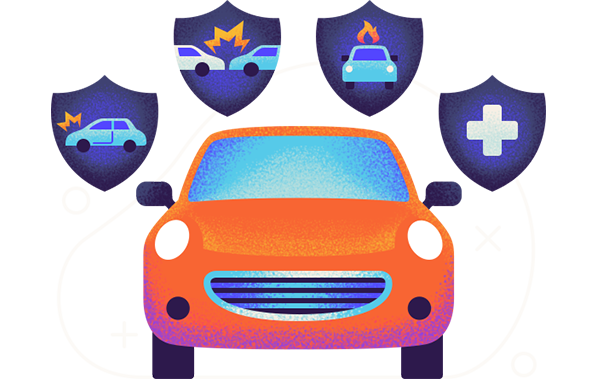The six most common types of car insurance are auto liability coverage, uninsured and underinsured motorist coverage, comprehensive coverage, collision coverage, medical payments coverage, and personal injury protection. Some types of coverage may be mandatory in your state, while some are only optional. Even if a type of coverage is not required by your state, it may still be available to purchase from your insurer.
The Six Types of Car Insurance
- Liability
- Collision
- Comprehensive
- Personal Injury Protection
- Uninsured/Underinsured Motorist
- Medical Payments
Liability Car Insurance
What It Covers: Other people's medical bills and property damage after accidents that you cause. It does not cover any expenses for you or your passengers (other than legal fees if you are sued for an accident).
Who Should Get It: Drivers in almost every state are required to have liability insurance in order to drive legally. New Hampshire is the only state that does not require liability car insurance (though you will need to meet other requirements).
To see some options, check out WalletHub's picks for the cheapest liability car insurance.
Collision Car Insurance
What It Covers: Damage to your own vehicle if you’re involved in an accident with another car, you hit a stationary object, or you get into a single-car accident, regardless of fault.
Who Should Get It: Drivers with a car loan or a lease will be required to carry collision insurance. You should also get it if you can’t afford to repair or replace your car if it’s unexpectedly damaged.
If you’re shopping for coverage, check out WalletHub’s list of the best collision insurance companies.
Comprehensive Car Insurance
What It Covers: Damage to your own vehicle that’s caused by something other than a collision, like vandalism or a natural disaster.
Who Should Get It: Drivers with a car loan or a lease will be required to carry comprehensive insurance. You should also get it if you can’t afford to repair or replace your car if it’s unexpectedly damaged.
You can check out WalletHub's picks for the best comprehensive insurance companies to learn more.
Personal Injury Protection (PIP)
What It Covers: Medical expenses for you and your passengers after an accident. Qualifying expenses can include traditional medical bills as well as costs not typically covered by health insurance such as lost income, child care or even a funeral.
Who Should Get It: Drivers in any of the 12 states where PIP is required. Even if it’s not required, you should purchase PIP if it’s available in your state and you can afford it, since it can protect you against hefty medical bills.
States Required: DE, FL, HI, MI, MA, KS, MN, NY, UT, OR, ND, and NJ
For more information, check out WalletHub's picks for the best personal injury protection providers.
Uninsured/Underinsured Motorist Coverage
What It Covers: Medical bills and vehicle repairs if you’re in an accident caused by an uninsured motorist or a driver who doesn’t have enough liability insurance to cover your expenses.
Who Should Get It: Drivers in D.C. and the 19 states that require uninsured motorist coverage. You should also consider purchasing it if you don’t have overlapping types of coverage, like collision insurance or PIP.
States Required: CT, IL, KS, MA, MD, ME, MN, MO, NC, ND, NE, NH, NY, OR, SC, SD, VT, WI, WV, and D.C.
Medical Payments (MedPay) Coverage
What It Covers: Accident-related medical expenses for you, your passengers, your household members and other policyholders. It can also cover the copays and deductibles of other insurance policies, including health insurance and PIP. This coverage type is similar to PIP but is more limited in scope.
Who Should Get It: Drivers in Maine and New Hampshire, where it’s required. If MedPay is optional in your state, you should still purchase it to supplement existing health insurance and PIP coverage.
You can check out WalletHub's picks for the best MedPay providers to learn more and find the best coverage.
Other Types of Car Insurance Coverage
Gap Insurance
Your vehicle depreciates over time, including the moment you drive it off the lot. In a catastrophic loss, your auto insurer will only pay your car’s actual cash value, which could be less than what you owe on a loan or lease. Gap insurance will pay for the dollar-amount “gap” between the balance of your financing and what your car is worth.
Umbrella Insurance
Umbrella insurance isn’t car insurance in the strictest sense. It’s an extra level of broad-based liability protection beyond homeowner and auto policies, and it protects assets of $1 million or more in case of a lawsuit.
Rental Reimbursement
While your car is being repaired under a claim, rental reimbursement will keep you on the road by covering the cost of a rental car. There are limits on how much the insurer will pay per day and per claim, but it’s usually enough to cover a rental for the full amount of time your car is in the shop.
Emergency Roadside Assistance
This coverage option will provide assistance if you lock yourself out of your car, need a tow or jump start, get a flat tire or run out of gas. If your car is inoperable, you can get a tow to a nearby garage of your choice, up to a specified distance.
Mechanical Breakdown Insurance
Mechanical breakdown insurance can cover the costs of repairs to mechanical parts and systems. This coverage is similar to extended warranties and service contracts, but unlike those products, you pay a monthly premium instead of paying a lump sum up front.
Usage-Based Insurance (UBI)
This is not a different type of insurance coverage; it’s just a new way to pay for insurance like liability, collision and comprehensive coverage. By permitting the insurer to track your mileage and driving habits, you become eligible for discounts.
Non-Owner Car Insurance
This is a type of liability insurance for people who do not own their own car. People without a car may need to purchase this insurance to get a suspended driver’s license reinstated.
SR-22 Insurance
An SR-22 is not a specific type of insurance, but rather a form that insurance companies file with the state to confirm that high-risk drivers are carrying the minimum required insurance. Coverage with an SR-22 is often confused for a specific type of car insurance, however.
How Much Car Insurance Do You Need?
You need to have at least the minimum amount of car insurance required by your state to drive legally. If you have a car loan or lease, you may need additional coverage to protect the lender’s investment. Whether you get additional coverage beyond what is required by your state or lender ultimately depends on your financial situation and risk tolerance, but more coverage is usually better for your finances long-term.
Purchasing more coverage than you’re required to get can help ensure you are financially protected if you are in an accident. For example, adding collision and comprehensive insurance to your policy can prevent you from paying out of pocket for all the repairs on your car. Higher liability limits can also protect your assets in the event of a lawsuit.
Learn more about how much car insurance you need.



WalletHub experts are widely quoted. Contact our media team to schedule an interview.